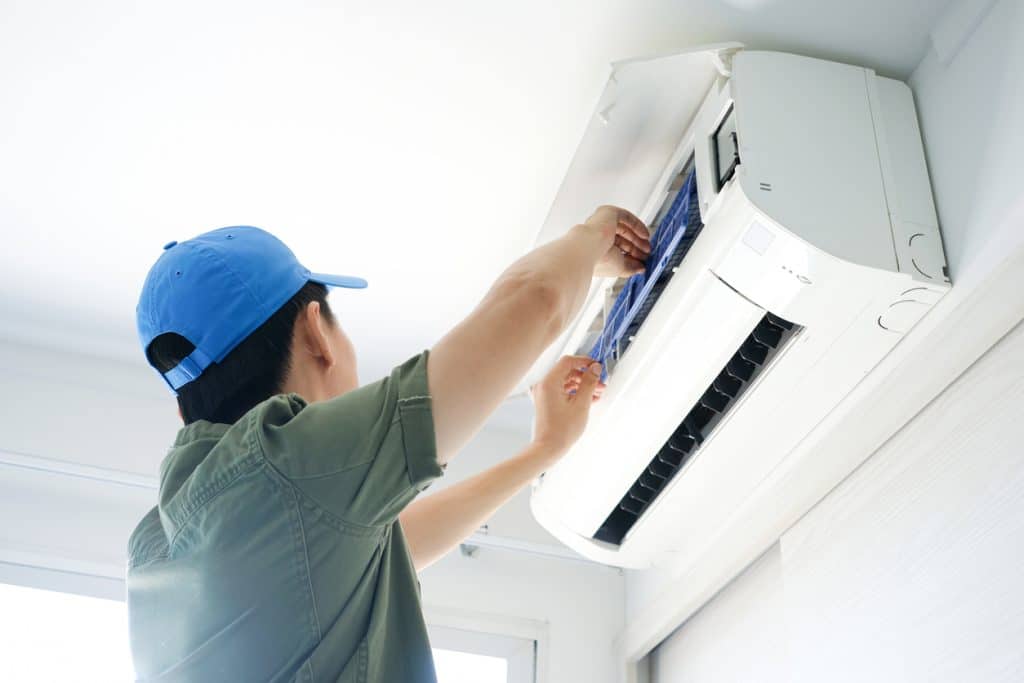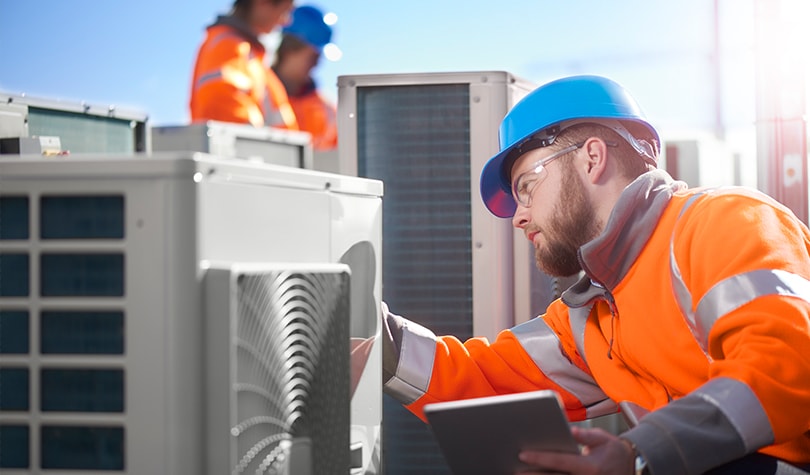Reasons why homeowners hire an HVAC contractor for seasonal maintenance
The Relevance of HVAC Knowledge: Uncovering Reasons For Air Conditioning Issues for House Owners
Property owners typically neglect the importance of understanding their a/c systems. Acknowledging common signs of air conditioning issues can result in prompt treatments. Concerns like insufficient cooling or uncommon noises are not just aggravations; they can show much deeper issues. By checking out the origin of these troubles, home owners can enhance system efficiency and extend its life expectancy. What are one of the most widespread issues that can arise, and how can they be successfully dealt with?
Usual Signs of AC Issues
How can homeowners identify problems with their a/c systems before they intensify? Identifying common indicators of a/c issues is important for prompt upkeep. One prevalent indication is not enough air conditioning; if the a/c unit stops working to lower the indoor temperature level, it may signal underlying problems. Uncommon sounds, such as grinding or hissing, can likewise indicate mechanical failings or loosened components - HVAC contractor. Additionally, homeowners should be wary of odd smells emanating from the unit, which could recommend mold and mildew development or electric troubles. Regular biking on and off, referred to as brief biking, can suggest thermostat problems or refrigerant leaks. A boost in energy costs without a corresponding surge in usage might direct to ineffectiveness. By staying sharp to these warning indicators, house owners can protect against extra considerable issues and costly fixings, guaranteeing their air conditioning systems run effectively throughout the warmer months

Recognizing Cooling Agent Issues
Refrigerant problems can significantly affect the performance of an a/c system. Property owners need to understand the signs of reduced cooling agent degrees and the relevance of detecting refrigerant leaks. Addressing these problems without delay can stop additional damage to the system and warranty optimal cooling down efficiency.
Low Refrigerant Levels
A common issue that homeowners may run into with their cooling and heating systems is reduced cooling agent levels, which can greatly affect the system's performance and efficiency. Refrigerant is essential for the cooling procedure, taking in heat from interior air and releasing it outside. When degrees drop, the cooling device battles to cool down the area successfully, causing increased energy intake and prospective system stress. Signs of low refrigerant consist of insufficient cooling, longer run times, and ice development on the evaporator coils. Home owners might likewise observe unusual noises as the compressor works harder to make up for the shortage. It is necessary for house owners to understand the value of keeping appropriate refrigerant degrees to ensure peak heating and cooling performance and longevity.
Refrigerant Leaks Discovery
Where might a property owner start when confronted with the possibility of refrigerant leakages in their cooling and heating system? The very first step includes monitoring the system's efficiency. Indications such as decreased cooling down performance, ice development on coils, or hissing sounds might show a refrigerant leak. Property owners must also look for noticeable indications of oil residue, usually an obvious indication of a leakage. Making use of a refrigerant leakage detector can offer even more accurate recognition. If suspicions persist, speaking with an accredited HVAC service technician is important, as they possess the experience and equipment to situate leaks effectively. Prompt discovery and repair of cooling agent leakages not just improve system efficiency however additionally prevent prospective ecological harm, making it an important facet of HVAC upkeep.
Electric Failures and Their Influence
Electric failures can significantly influence cooling and heating systems, specifically with concerns like breaker malfunctions and faulty electrical wiring. These troubles not only interrupt the system's performance however can likewise cause costly repairs and security risks. Comprehending the effects of such failings is important for house owners to preserve a reliable and safe HVAC atmosphere.
Circuit Breaker Issues
Exactly how can circuit breaker issues affect the effectiveness of a cooling and heating system? Circuit breakers act as essential safety and security tools that take care of electric flow to a/c units. If a breaker journeys regularly, it interrupts power supply, bring about inconsistent home heating or air conditioning. This can trigger considerable pressure on the system, resulting in inefficient operation and potential damage to elements. Homeowners may observe increased energy bills because of the heating and cooling system's battle to maintain desired temperature levels. Additionally, repeated interruptions from tripped breakers can shorten the life-span of the AC unit, calling for pricey fixings or replacements. Routine maintenance of circuit breakers is crucial, as it guarantees a stable power supply, ultimately boosting the total efficiency of the a/c system.
Faulty Wiring Effects
Regularly ignored, defective circuitry can have dire effects for HVAC systems. Electrical wiring problems may result in short circuits, resulting in regular break downs and boosted repair costs. Additionally, incorrect wiring can trigger ineffective energy usage, resulting in higher energy costs and stress on the system. In serious cases, faulty electrical wiring can set off electrical fires, posturing a significant safety and security risk to house owners. These electrical failings can harm Cooling and heating parts, resulting in pricey substitutes or extensive repair services. Homeowners should prioritize routine evaluations by qualified experts to recognize and remedy circuitry troubles prior to they escalate. Understanding the effects of faulty circuitry can help guarantee the longevity and security of a/c systems, eventually securing both the home and its owners.
Clogged Filters and Their Repercussions
While several property owners may forget the relevance of regular filter upkeep, clogged filters can lead to considerable effects for heating and cooling systems. When filters become obstructed with dirt, dust, and particles, airflow is restricted. This decrease in airflow requires the system to function harder, resulting in raised energy consumption and possibly higher utility bills. Over time, this stress can create deterioration on components, leading to early system failure.
Additionally, clogged filters can jeopardize interior air top quality. Toxins and irritants might flow throughout the home, worsening breathing concerns and allergies for occupants. Poor airflow can create the evaporator coil to freeze, leading to pricey repairs and inefficient air conditioning efficiency. On a regular basis changing or cleansing filters is a straightforward yet necessary maintenance job that can help assure the long life and performance of cooling and heating systems, ultimately profiting both the home owner's comfort and their finances.

Thermostat Malfunctions Discussed
What occurs when a thermostat breakdowns can substantially affect both comfort and power performance in a home (ac fix). A defective thermostat might stop working to accurately check out the temperature level, resulting in overcooling or not enough air conditioning. This disparity can create discomfort for owners and result in higher energy bills, as the a/c system functions harder than essential
Usual concerns consist of dead batteries, which can provide electronic thermostats inoperative, and loose wiring that disrupts communication between the thermostat and the cooling and heating device. Furthermore, out-of-date or inadequately adjusted thermostats may not respond correctly to temperature Continued level adjustments, even more aggravating power inadequacy.
Homeowners must be watchful for signs of malfunction, such as inconsistent temperatures or unforeseen power prices. Routine checks and understanding of the thermostat's performance can assist determine issues early, making certain peak efficiency of the heating and cooling system. Resolving thermostat concerns without delay is essential for maintaining a comfy living setting and managing power consumption properly.
The Function of Regular Upkeep
Routine maintenance plays a vital role in ensuring the longevity and effectiveness of a/c systems. Homeowners that focus on regular checks can stop small problems from escalating right into pricey repair services. Regular upkeep usually includes jobs such as cleaning up filters, inspecting ductwork, and examining refrigerant degrees. These activities assist preserve ideal air flow and system efficiency, minimizing energy usage.
Moreover, a well-maintained a/c system operates extra effectively, giving constant comfort throughout the home. Normal tune-ups can also prolong the lifespan of the device, causing significant financial savings in time. Property owners are motivated to set up expert assessments at least when a year to identify continue reading this prospective issues early.
Additionally, several manufacturers call for regular maintenance to maintain warranties, making this method not only valuable yet usually essential. On the whole, comprehending the significance of regular upkeep equips homeowners to safeguard their cooling and heating systems versus unexpected failures and improve their financial investment in home convenience.
Regularly Asked Questions
Just How Can I Improve My A/c's Power Efficiency?
Improving an air conditioner's energy performance entails routine upkeep, cleaning or replacing filters, securing ductwork, making sure appropriate insulation, utilizing programmable thermostats, and scheduling expert inspections to determine and remedy potential concerns impacting efficiency.
What Is the Life expectancy of a Common Cooling Unit?
A typical a/c system has a life-span of 15 to twenty years, relying on maintenance, use, and environmental elements. Regular maintenance can considerably prolong its operational life and enhance general efficiency.
When Should I Replace My A/c System?
An a/c system ought to typically be replaced every 10 to 15 years. Indicators for replacement consist of frequent repair work, climbing power expenses, and insufficient cooling, indicating that an upgrade may be a lot more economical and efficient.
Can I Fix AC Problems Myself?
Yes, individuals can fix AC troubles themselves by inspecting filters, ensuring power supply, and checking for noticeable issues (ac unit replacement). Nevertheless, complicated problems usually require professional help for precise diagnosis and risk-free repair service, ensuring optimal system efficiency
Exactly how Do I Pick a Dependable HVAC Technician?

To choose a reputable heating and cooling professional, one need to seek recommendations, examine on the internet evaluations, confirm licenses and insurance coverage, assess experience, and demand in-depth estimates to ensure top quality service and reasonable prices prior to choosing.
Final thought
To sum up, a strong understanding of a/c systems enables house owners to successfully identify and attend to common air conditioning problems. Acknowledging indicators such as insufficient air conditioning or increasing energy prices enables prompt interventions, which can greatly boost system performance and durability. By remaining informed about possible troubles like cooling agent leaks, electric failures, and clogged filters, property owners can take proactive actions to keep their systems, eventually making Going Here sure convenience and promoting a much healthier living setting. Regular maintenance stays vital to this venture.